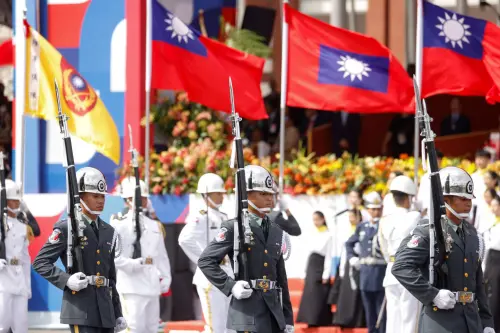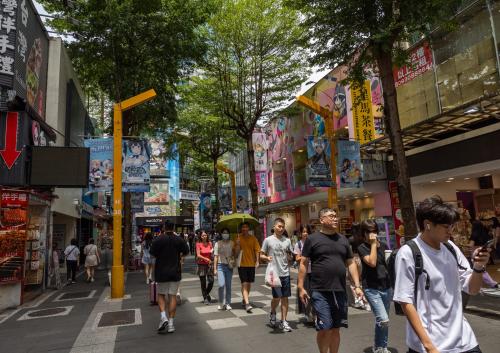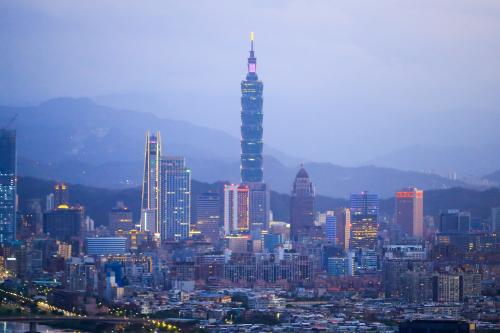The outcome of Taiwan’s 2024 presidential election is defined by a structural feature of Taiwan’s constitution. That is, a candidate who wins a plurality of the vote but not a majority still becomes the president.
In the last five elections, the leaders of the two major parties have gone head-to-head and the winner received a majority. The two major parties are the Kuomintang (KMT), the ruling party during the authoritarian era that facilitated the transition to democracy in the 1990s, and the Democratic Progressive Party (DPP), the current ruling party.
How Taiwan’s presidential election is different this year
This year is different. In addition to Hou Yu-ih, the KMT candidate, and William Lai Ching-te, the DPP candidate, there is Ko Wen-je, the charismatically quirky candidate of the Taiwan People’s Party (TPP), which he created.
Simplistically, the KMT has been in favor of engaging China, at least economically. The DPP has stressed the threat that China poses to Taiwan over time. And the TPP has thrived on an anti-establishment stance and strong support from young people. The media’s characterization of the KMT as pro-China and the DPP as pro-independence misrepresents a more complex reality.
I follow the My Formosa tracking poll, and its latest iteration gave Lai 35.2%, Hou 32.1%, and Ko 19.7% favorability to win, with a margin of error of 2.8%. With some variation, this has been the division of voter sentiment for much of the campaign.
The KMT and TPP candidates, Hou and Ko, have split the anti-DPP share of the electorate. Lai has never polled over 50%. Many people think that after almost eight years in power, the DPP should be replaced.
Clearly, if Hou and Ko could form a joint ticket, they could probably win power. And there was a serious attempt in November to do just that. However, the KMT and TPP disagreed on how to determine whether Hou or Ko should be at the top of the ticket and the effort failed. Ko lost some support because he was willing to ally with the KMT, an establishment party, thus diminishing his own anti-establishment brand.
There’s one other factor at play in the horse race. That is, voter mobilization, or making sure that your party’s loyal supporters actually go to the polls. Generally, the DPP is better at this than the other parties, mobilizing through the media. The KMT will rely more on its organizational networks. Ko, who lacks a strong party capacity, will use his charisma.
Another point: For the past almost eight years, the party that controls the presidency has had a majority in the legislature. The general consensus is that no party will control both the presidency and the legislature this time, which means that governance may be more difficult than it has been.
What are the concerns of Taiwan’s voters?
Policy toward China is always a significant issue in Taiwan’s presidential campaigns. And it’s inevitable that it would be, and that people would disagree. China does pose a big challenge to Taiwan.
The KMT is trying to make the case that the DPP’s China policy is too reckless. It says that this election is a choice between peace and war, and that it is the party of peace. The DPP asserts that it’s China that is dangerous, so Taiwan needs to strengthen deterrence and improve relations with the United States.
Each major party has tried to reassure voters that its China policy is correct. DPP presidential candidate Lai has asserted that he will not pursue independence as the KMT charges but will continue President Tsai Ing-wen’s balanced policy. KMT presidential candidate Hou claims that he can maximize the benefits of a China relationship while still protecting Taiwan’s interests.
But voters are focused on other issues. Young people who are not employed in the information technology sector worry that they will never get good jobs, get married, and have families. Taking care of Taiwan’s aging population puts a strain on fiscal resources. There has been an ongoing debate over the proper mix of sources of energy. Young men are not exactly excited about a partial restoration of conscription.
So, quality-of-life issues are more salient than China once was. To put it differently, China and domestic concerns are always entangled in complicated ways. The presidential candidates are each in their own way trying to reassure voters regarding China while promising policies to improve the quality of life.
The election’s impact on U.S., Taiwan, and China relations
Warnings have been made that if DPP presidential candidate Lai wins the election, he will inevitably move toward de jure or legal independence for Taiwan, which in turn will trigger a cross-Strait war that will involve the United States.
I think this view is wrong, for a couple of reasons.
First, Lai has shifted his position on China toward the cautious path that Tsai has followed. He claims to be the candidate to protect the status quo, and he agrees with Tsai’s stance of neither bowing to pressure from the People’s Republic of China nor provoking China simply because Taiwan has the support of the United States.
Second, although China would respond to a Taiwan declaration of independence with a military campaign, Beijing knows that this would be quite risky, in part because the People’s Liberation Army is not ready to undertake such a complicated campaign.
Third, China has the option of continuing the strategy that it has pursued toward the Tsai administration, that is, a wide-ranging campaign of coercion that includes displays of military force but a variety of non-military pressure and intimidation. This is a low-risk approach. It targets the confidence of the people of Taiwan, and there are signs that it is gradually working.
Fourth, although China would relax its coercive measures if KMT candidate Hou were to win, it is not clear how far the two sides would return to the days when KMT President Ma Ying-jeou pursued a policy of engaging China. A lot has changed since 2008. Among them, the KMT is more cautious toward China now than when Ma was in power, in part because of the PRC’s behavior in places like Hong Kong and in part because of shifts in Taiwan public opinion.
Ultimately, the people of Taiwan will choose their next leader on January 13. Whichever candidate and party is victorious, they will then face the challenges of governing. Their starting point will be the status quo preferences of the population.
The Brookings Institution is committed to quality, independence, and impact.
We are supported by a diverse array of funders. In line with our values and policies, each Brookings publication represents the sole views of its author(s).








Commentary
Explaining Taiwan’s 2024 presidential election
December 18, 2023